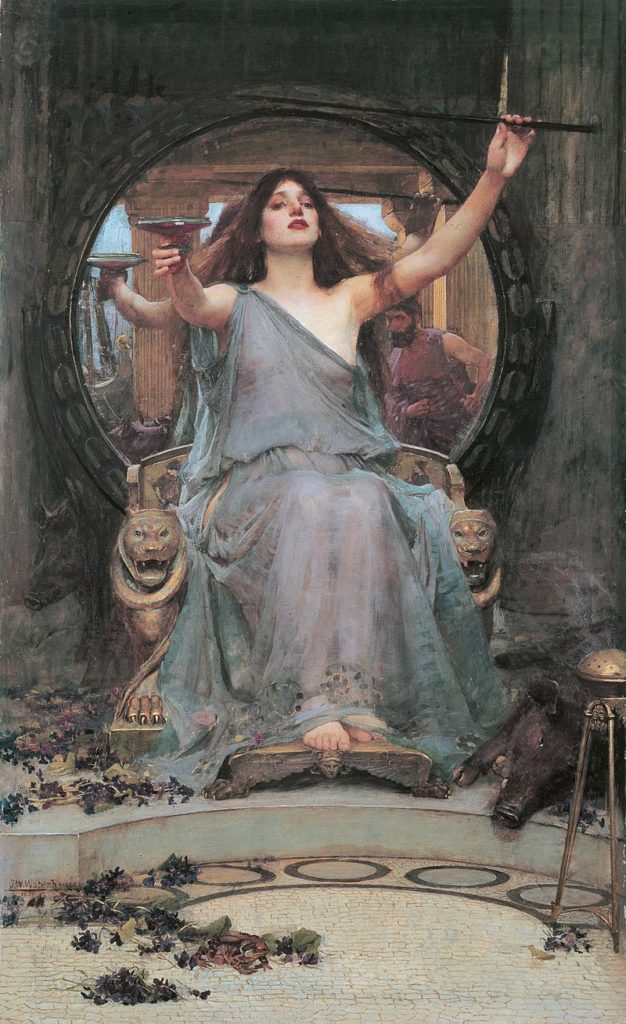
Thursday
This past Tuesday I provided a guide for understanding the significance of literary monsters, which I followed up with a somewhat scattered analysis of Homer’s monsters in The Odyssey. Monsters, I noted, are associated with deep anxieties, and emasculation anxieties are at the heart of Homer’s epic.
We see this right away when, before any mention of Odysseus, Zeus talks of Agamemnon being killed by his wife’s lover upon returning home. The incident is referred to time and again in the poem, and, upon reflection, we can see why. For a warrior or mariner absent from home for long periods, the fidelity of a wife could become an obsession.
The story of Agamemnon functions as a foil to the story of Odysseus. One man comes home to an unfaithful wife, the other to a faithful one. Agamemnon describes what can happen when Odysseus talks to him in Hades:
As I lay dying, struck through by the sword,
I tried to lift my arms up from the ground.
That she dog [Clytemnestra] turned away. I went to Hades.
She did not even shut my eyes or close
my mouth. There is no more disgusting act
than when a wife betrays a man like that.
That woman formed a plot to murder me?
Her husband? When I got back home I thought
I would be welcomed, at least by my slaves
and children. She has such an evil mind
that she has poured down shame on her own head
and on all other women, even good ones.
Agamemnon issues a warning, although he then acknowledges that Odysseus’s wife is an exception:
So you must never treat your wife too well. Do not let her know everything you know. Tell her some things, hide others. But your wife will not kill you, Odysseus. The wise Penelope is much too sensible to do such things.
Of course, an unfaithful wife is at the root of the Trojan War itself. Male insecurity goes so deep that the Greeks are willing to fight a ten-year war over it!
My students never fail to point out that, in this patriarchal culture, the double standard is alive and well. Agamemnon actually strides into his court accompanied by his slave mistress Cassandra (Clytemnestra kills her too), while Odysseus titillates his audience with his accounts of bedding down with island goddesses. In conquering Circe, the threat of male violence proves more effective than female wiles:
But I drew my sharp sword from my thigh and leapt at her as if I meant to kill her. She screamed and ducked beneath the sword, and grasped my knees…
Circe acknowledges she’s dealing with a real man:
…Now sheathe your sword and come to bed with me. Through making love we may begin to trust each other more.
I can imagine his Phaeacian audience salivating over what happens after Circe swears a vow and surrenders:
She vowed and formed the oath, and then at last I went up to the dazzling bed of Circe.
There’s a similar passage in the Calypso account:
The sun went down and brought the darkness on. They went inside the hollow cave and took the pleasure of their love, held close together.
Odysseus gets more specific in his account of Circe pampering him:
[S]he took me to the bathtub, and began to wash my head and shoulders, using water mixed to the perfect temperature, to take my deep soul-crushing weariness away. After the bath, she oiled my skin and dressed me in fine wool cloak and tunic, and she led me to a silver-studded well-carved chair, and set a footstool underneath.
Since men know about their own adulterous urges, they figure their wives must have them as well. This projection makes them vulnerable, however. While denied power or equal rights, women in patriarchal cultures can throw men into crisis simply by causing them to doubt their ability to maintain control.
Therefore, the imagine female monsters. The Odyssey provides us with a substantial list:
–the queen of the cannibalistic Laistrygonians, described as “a woman, mountain-high”:
–the witch Circe, who turns men into swine;
–the Sirens, whose song no man can resist (unless he has had himself tied to his ship’s mast);
–Scylla, the six-headed monster who lives in a cave. I’ve seen her described as a “vagina dentata” or toothed vagina, one who snatches passing mariners and proves impervious to Odysseus’s sword;
–perhaps the whirlpool Charybdis, which has also been described as a vagina that swallows men up; and
–the goddess Calypso, who (as she points out) is far more beautiful than Penelope and who imprisons Odysseus for seven years while tempting him to forget home and duty. (He sleeps with her every night but reluctantly as “she no longer pleased him.”)
As for Penelope, while she proves faithful, there’s debate about her handling of the suitors. True, she’s outwardly faithful, but her ploy of putting them off by weaving an interminable funeral shroud for her father-in-law (she unweaves it every night) has the practical effect of keeping her house filled with young studs who ceaselessly sing her praises.
But because the epic wants a different ending than Agamemnon’s, in the end Penelope reassures us that not all women are unfaithful. The female monsters are thwarted, the islands goddesses are left behind, and macho Odysseus is able to make love to his wife in a marriage bed that has been constructed out of a living and deeply rooted tree. Order is restored and all is well.
Homer’s male auditors breathe a sigh of relief. The epic has given us a glimpse into their nightmares, however.